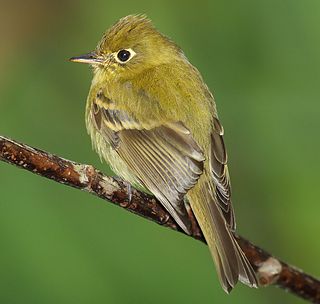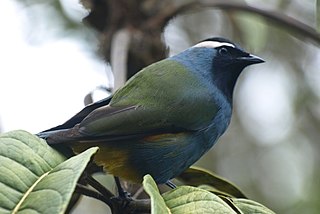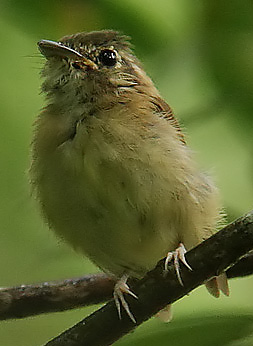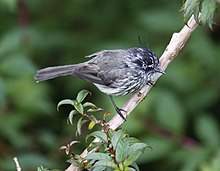
Shrikes are passerine birds of the family Laniidae. The family is composed of 34 species in two genera.

The tits, chickadees, and titmice constitute the Paridae, a large family of small passerine birds which occur mainly in the Northern Hemisphere and Africa. Most were formerly classified in the genus Parus.

The tyrant flycatchers (Tyrannidae) are a family of passerine birds which occur throughout North and South America. They are considered the largest family of birds known to exist in the world, with more than 400 species. They are the most diverse avian family in every country in the Americas, except for the United States and Canada. The members vary greatly in shape, patterns, size and colors. Some tyrant flycatchers may superficially resemble the Old World flycatchers, which they are named after but are not closely related to. They are members of suborder Tyranni (suboscines), which do not have the sophisticated vocal capabilities of most other songbirds.

The silky-flycatchers are a small family, Ptiliogonatidae, of passerine birds. The family contains only four species in three genera. They were formerly lumped with waxwings and hypocolius in the family Bombycillidae, and they are listed in that family by the Sibley-Monroe checklist. The family is named for their silky plumage and their aerial flycatching techniques, although they are unrelated to the Old World flycatchers (Muscicapidae) and the tyrant flycatchers (Tyrannidae).

The painted berrypeckers, Paramythiidae, are a very small bird family restricted to the mountain forests of New Guinea. The family comprises three species in two genera: the tit berrypecker in Oreocharis, and the eastern crested berrypecker and western crested berrypecker in Paramythia. These are colourful medium-sized birds which feed on fruit and some insects. These species were formerly included in the Dicaeidae, but DNA–DNA hybridization studies showed these species were related to each other but distinct from the flowerpeckers. Some sources group painted berrypeckers as two genera belonging to the berrypecker family Melanocharitidae.

The rufous mourner is a small passerine bird in the tyrant flycatcher family. It breeds from southwestern Mexico to northwestern Ecuador. It was formerly believed to be a cotinga, but well-supported anatomical evidence has shown it to be related to tyrant flycatchers of the genera Myiarchus, Sirystes and Casiornis.

Cettiidae is a newly validated family of small insectivorous songbirds ("warblers"), formerly placed in the Old World warbler "wastebin" assemblage. It contains the typical bush warblers (Cettia) and their relatives. As a common name, cettiid warblers is usually used.

The spadebills are a genus, Platyrinchus, of Central and South American passerine birds in the tyrant flycatcher family Tyrannidae. They have broad, flat, triangular bills.

The agile tit-tyrant is a species of bird in the family Tyrannidae, the tyrant flycatchers. It is native to Bolivia, Colombia, Ecuador, and Venezuela.

The ash-breasted tit-tyrant is a species of bird in the family Tyrannidae. It is found in Bolivia and Peru.
The Juan Fernández tit-tyrant is a species of bird in the family Tyrannidae. It is endemic to the Juan Fernández Islands in the South Pacific Ocean off Chile. Its natural habitats are subtropical or tropical moist lowland forests, rural gardens, and urban areas. It is threatened by habitat loss.

The yellow-billed tit-tyrant is a species of bird in the family Tyrannidae. It is found in Argentina, Bolivia, Chile, and Peru.

The black-crested tit-tyrant or Marañón tit-tyrant is a species of bird in the family Tyrannidae. It is found in Ecuador and Peru. Its natural habitats are subtropical or tropical moist montane forests and subtropical or tropical high-altitude shrubland.

The tufted tit-tyrant is a species of bird in the tyrant flycatcher family Tyrannidae. This species is found in western South America; its range stretches from southern Colombia south along the Andes mountains to Tierra del Fuego. It prefers to live in upper montane forests and shrublands; however, it is a habitat generalist and can be found across a wide range of ecosystems. The tufted tit-tyrant has three subspecies, including the nominate subspecies Anairetes parulus parulus, A. p. aequatorialis, and A. p. patagonicus, and is very closely related to the Juan Fernández tit-tyrant. It is very small with a distinctive and conspicuous crest. The bird's head is black overall with white supraloral and postocular stripes. Its dull grayish-brown back contrasts with its white throat and breast that are covered with black streaks and pale, unmarked yellow underbelly. There are few noticeable differences in plumage between the subspecies. It is a vocal flycatcher with a broad repertoire of songs.

The pied-crested tit-tyrant is a species of bird in the family Tyrannidae. It is found in coastal Peru and far northern Chile.

Phylloscartes is a genus of small birds in the family Tyrannidae. They are found in wooded habitats of Central and South America. They mainly feed on small arthropods, and most commonly take part in mixed species flocks. The mottled-cheeked tyrannulet is among the commonest birds in its range, but several other species are rare and threatened. Their plumage is predominantly green, yellow, white and grey, and many have contrasting facial patterns and wing-bars. They have thin, pointed bills, and relatively long tails. Most frequently cock their tail, perch relatively horizontally and are very active.

Pogonotriccus is a genus of small passerine birds in the family Tyrannidae. They are found in wooded habitats of Central and South America.

Uromyias is a genus of small Andean, tyrant flycatchers known as tit-tyrants. They were formerly recognized based on syrinxial and plumage characters, including a flatter crest and a longer tail, but was included within Anairetes due to genetic analysis. Recent analyses suggested splitting into Uromyias again.

Anairetes is a genus containing the tit-tyrants, a group of small, mainly Andean birds, in the tyrant flycatcher family Tyrannidae. The group briefly included the genus Uromyias, which had been recognized based on syringeal and plumage characters, including a flatter crest and a longer tail, but was included within Anairetes due to genetic analysis. Recent analyses suggested splitting into Uromyias again. Anairetes is believed to be most closely related to the genera Mecocerculus and Serpophaga; however, there is no definitive evidence supporting this claim.
















